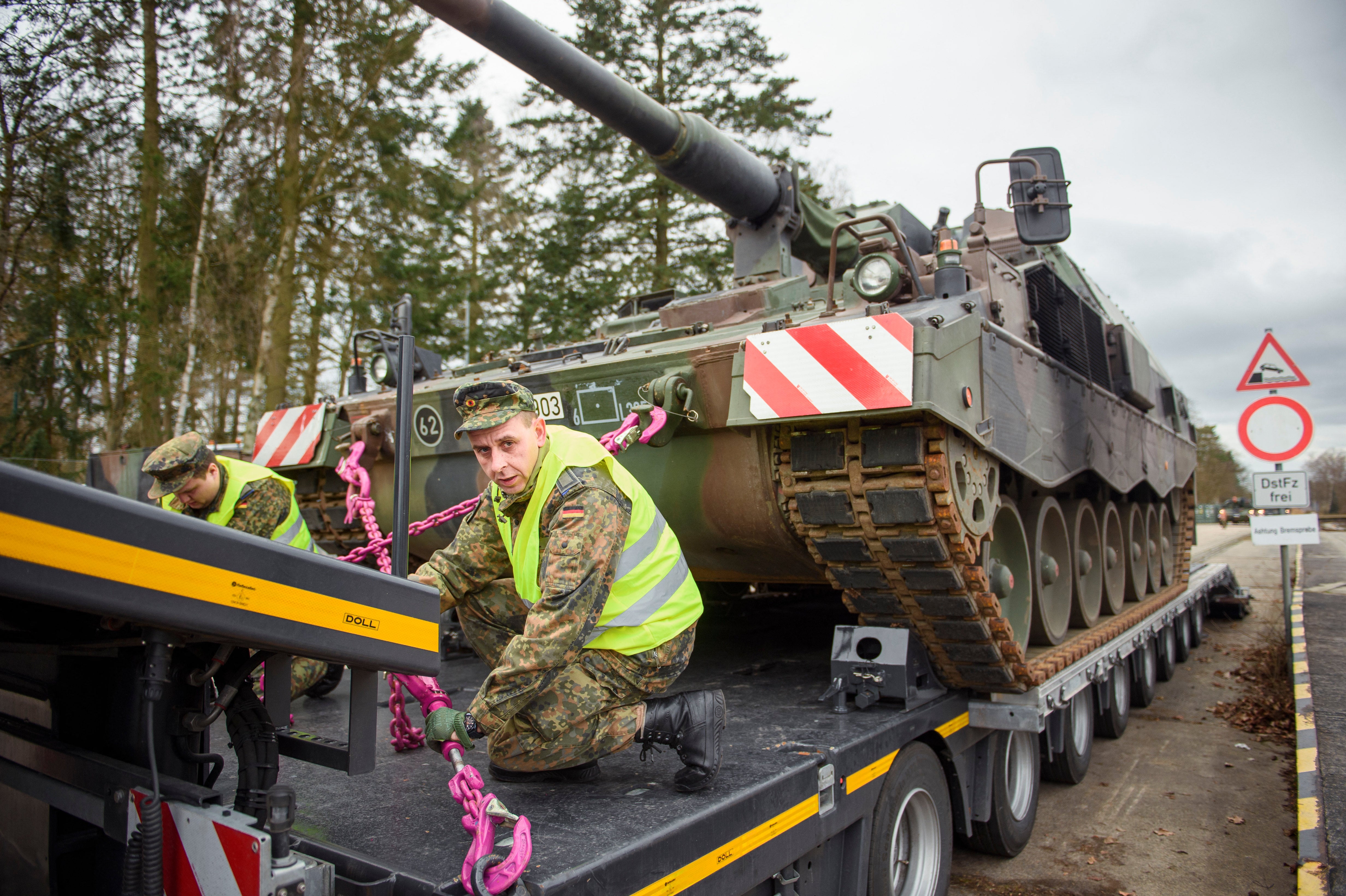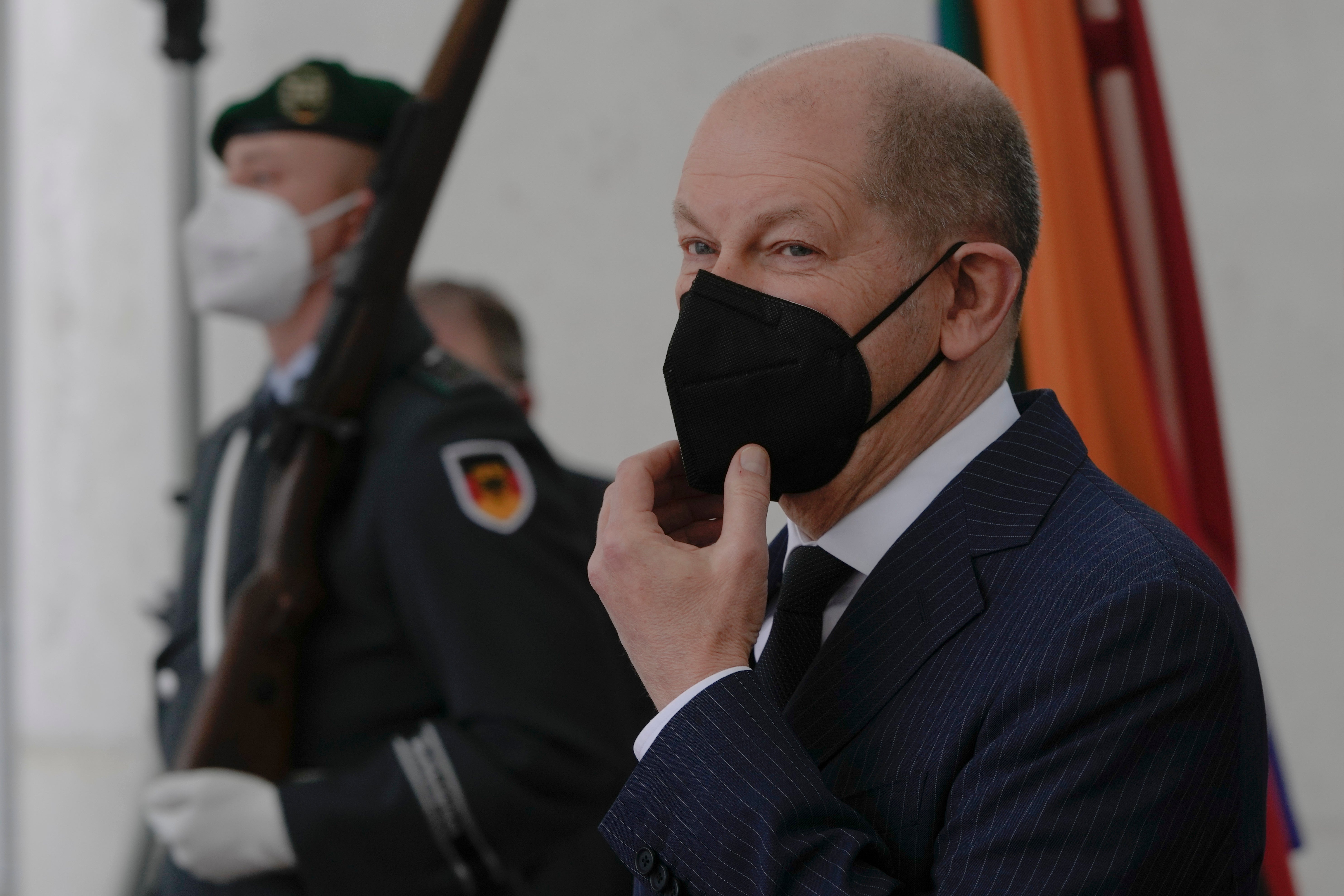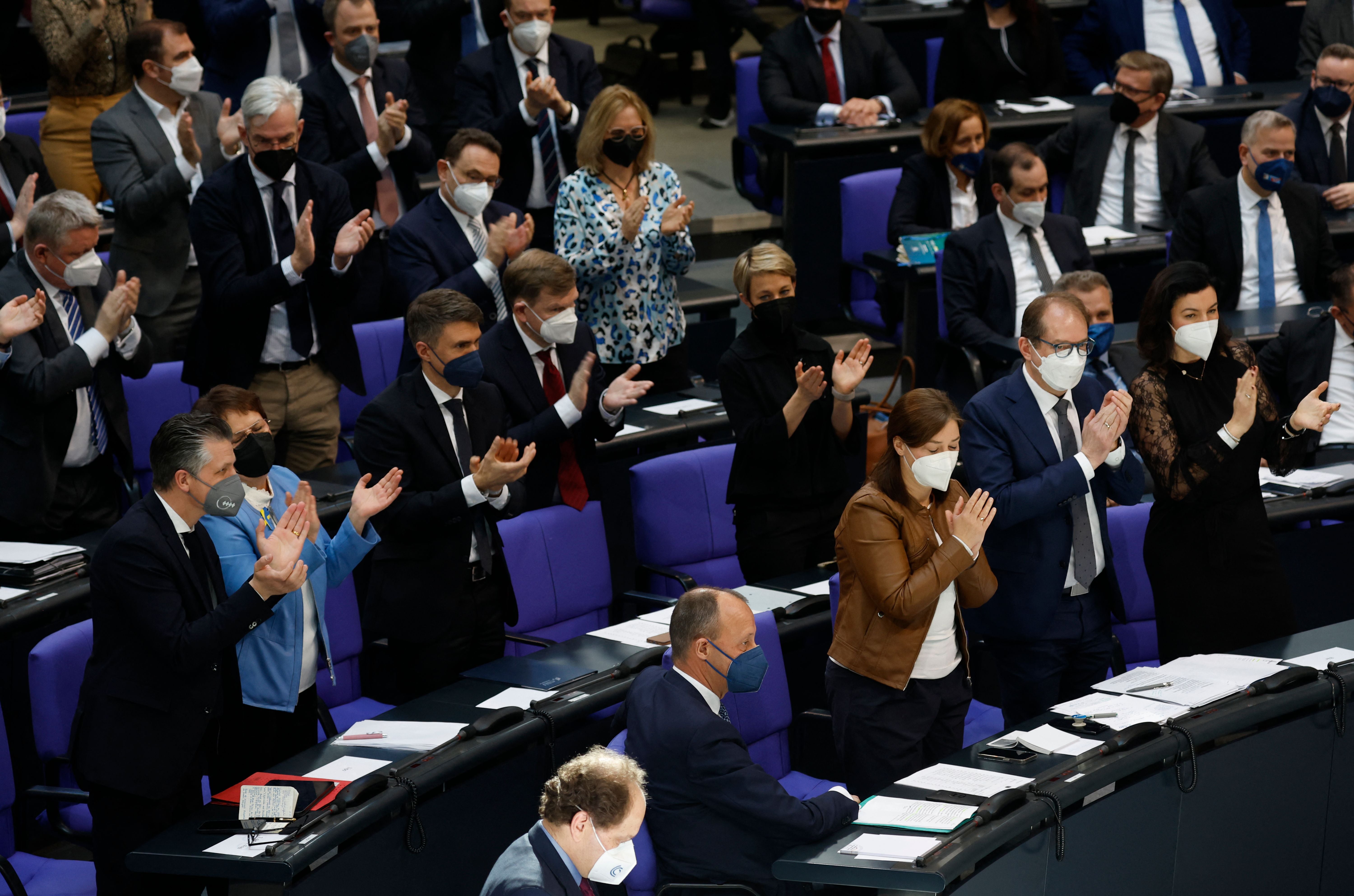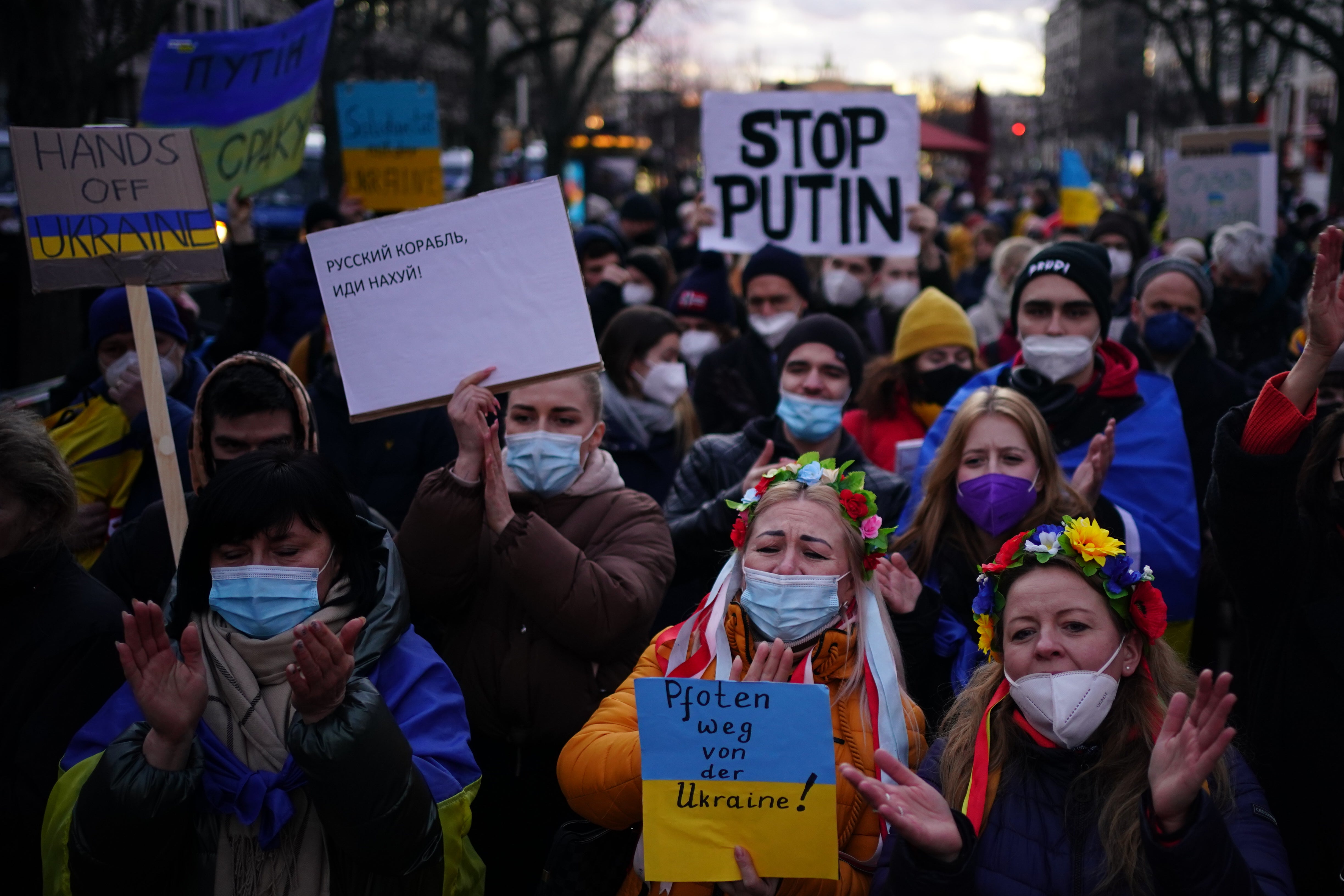How Putin’s war in Ukraine has spurred Germany to abandon its post-WWII pacifism
German chancellor Olaf Scholz has reversed decades of foreign policy by boosting defence spending and sending arms to Ukraine after criticism of Berlin’s soft approach towards Moscow, reports Erik Kirschbaum

Russia’s invasion of Ukraine has shaken Germany out of its post-Cold War pacifism and almost overnight turned the country with a deep-seated aversion to war – and even its own largely neglected armed forces – from a laggard into a leader among European nations seeking to support Kyiv.
Even though it was the ominous German militarism of the last century that terrorised the country’s neighbours and caused destruction across the continent, it has been the pacifism-at-any-price policies from Europe’s leading nation that had been a cause of concern in recent years – especially in the wake of growing, unchecked tensions between the European Union and Russia.
That all took a dramatic turn on Sunday when the new German government announced it would scrap its self-imposed ban on sending weapons to conflict zones in order to help Ukraine, and also set up a €100bn (£83.4m) fund to re-equip its woefully underfunded military – worth more than double the €47bn it was originally planning to spend on defence this year.
Germany also said it would ditch its longstanding practice of preventing other EU countries from sending German-made weapons to crisis regions.
“The times have changed,” chancellor Olaf Scholz told a special session of parliament on Sunday. “The world is no longer the same.
“The horrific images from Kyiv, Kharkiv, Odesa and Mariupol show the whole ruthlessness of Putin,” he said. “It is clear that we need to invest significantly more in the security of our country in order to protect our freedom and our democracy.”
Countries across Europe and beyond are quickly shifting from stances to preserve the peace to bolstering their defences, but nowhere has the transformation been as significant as in Germany – a country that had long neglected its military and long resisted even carrying its own fair share of Nato’s defence burdens until Russia’s invasion.
The lethargy in Germany when it comes to the military ... was destroyed in one fell swoop by Putin’s invasion of Ukraine
Sunday’s announcement capped a remarkable week for Berlin in which it also dropped its opposition to the EU cutting off several Russian banks from the Swift international payment system, halted certification of the Nord Stream 2 gas pipeline from Russia to Germany, and said it would consider a more radical energy approach to cut its dependency on Moscow for gas.
More than 30 years of post-Cold War policies aimed at squeezing the most out of the “peace dividend” promised in 1990 were embodied by former chancellor Angela Merkel.
Mr Scholz took over from Ms Merkel in December and started off following in her cautious footsteps. That all changed late last week with Russia’ invasion of Ukraine and it quickly became clear that Germany’s EU and Nato partners were not going to stand for any more pussyfooting from Europe’s most powerful economy.

“The lethargy in Germany when it comes to the military that was so long nurtured by Merkel was destroyed in one fell swoop by Putin’s invasion of Ukraine,” said Thomas Jaeger, political scientist at Cologne University.
“The German government’s 180-degree turn on military spending this weekend and its decision to send weapons abroad is a complete repudiation from Merkel’s policies towards Russia,” he told The Independent. “Even though it’s long overdue, it’s still hard to imagine how enormous this change of heart has been. I don’t think anyone expected this.”
Germany was becoming increasingly embarrassed by its widely-ridiculed hesitancy to support Ukraine and sever ties to its main energy supplier Russia.
With its extensive business ties to Moscow – and dependence on Russia for more than half of its natural gas supplies – Germany had come under criticism from its peers in the EU and Nato for dragging its feet on sending defensive arms to Ukraine and agreeing to tough economic sanctions.
Sending defensive weapons to Ukraine is the least we can do now
Poland’s prime minister Mateusz Morawiecki told journalists in Berlin on Saturday ahead of a meeting with Mr Scholz that he could not understand how Germany, the world’s fourth-largest exporter of weapons, could only offer to send Ukraine 5,000 army helmets but not any weapons because of its self-imposed ban on shipping arms into conflict zones.
“What kind of help was delivered to Ukraine – 5,000 helmets? This must be a joke,” he said.
Eleven years ago, then-Polish foreign minister Radoslaw Sikorski caused a stir across the continent when he pleaded in a speech in Berlin with Germany to stop hiding behind its distant history of war shame and start leading Europe.
“I fear a powerful Germany less than an inactive Germany,” Mr Sikorski said at the time, adding he was aware that he was the first Polish foreign minister ever to make such an assertion.
Evidently swayed by the mounting backlash from abroad over Germany’s cautious stance, Mr Scholz finally dropped the resistance to exporting arms to Ukraine late on Saturday – after meeting Mr Morawiecki.
The German chancellor opened the floodgates further on Sunday with the surprise announcement that Germany would immediately raise its defence spending to 2 per cent of gross domestic product (GDP) from 1.4 per cent currently. Ms Merkel promised at a Nato meeting in 2014 that this target would be met by 2024 but later said it would not be possible in that timeframe.

Raising such spending was a perennial demand by former US presidents Barack Obama and Donald Trump, while Nato partners that spend far higher shares of their GDP on defence have also put pressure on Berlin.
Germany’s underfunded armed forced – the Bundeswehr – has been plagued by parts shortages that have grounded most of its Luftwaffe fighter jets and many of its tanks.
Despite its aversion to war following the horrors of the Second World War, Mr Scholz said on Saturday that Germany would send 1,000 “Panzerfaust 3” (Tank Fist) anti-tank weapons and 500 “Fliegerfaust 2” (Flying Fist) Stinger missiles to Ukraine.
Jettisoning the vestiges of its historical baggage left over from that war, Germany also said it would finally allow other European countries to immediately send their own supplies of German-made arms to Ukraine permitting the Netherlands to deliver 400 RPGs and Estonia to ship nine howitzers.
“The time for feeding us fairy tales is over,” said Karl Schlögel, a leading historian, referring to previous German government narratives that said security in Europe was only possible with Russia as a close partner and ally.
“Putin showed us that he is prepared for things that we’re not. The fog has lifted. The post-war generation knew only peace and isn’t capable of taking action because the only war it knows of is on TV.”
The about-face by Mr Scholz and his centre-left government has surprising widespread support among ordinary Germans.
A poll of 1,000 people by broadcaster RTL/NTV on Tuesday found that 78 per cent of respondents supported the government’s decision to beef up defence spending.
On Sunday, more than 500,000 people took part in a peace rally in Berlin’s central boulevard – less than a mile from the Reichstag’s special session – listening to one speaker after another criticise Russian president Vladimir Putin and Russia for invading Ukraine.

“We want to show our solidarity with the people of Ukraine who are fighting for their lives,” said Luisa Herbst, a 23-year-old law student at the rally.
“I woke up on Thursday to war in Europe that I thought would never ever happen,” she told The Independent. “I’m still in total shock. I was against sending weapons to Ukraine but think it’s the right thing to do now. It’s not right that we’ve been hiding behind our history for this long. The Ukrainians need our help.”
An 80-year-old woman named Eda said she has early child memories of the Second World War and came to the rally to show her solidarity for Ukraine.
“It’s better to be here instead of watching helplessly,” said Eda, who declined to give her surname. “We can show Russia how we feel in Germany about their invasion. I was born during World War II and we’ve been living with the consequences of that war our entire lives. I never thought we’d be on the verge of another world war. It’s just horrible.”
Nearby, 30-year-old Volker Donnermann was holding a sign that read “Shame on Germany”.
“Germany should be ashamed for being so naive over the years with its policies towards Russia and not seeing how dangerous he really is,” Mr Donnermann said. “We never stood up to him and we shouldn’t have allowed ourselves to become so dependent on Russian natural gas. Sending defensive weapons to Ukraine is the least we can do now.”






Join our commenting forum
Join thought-provoking conversations, follow other Independent readers and see their replies
Comments